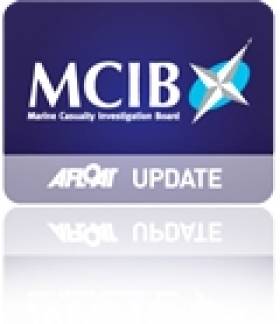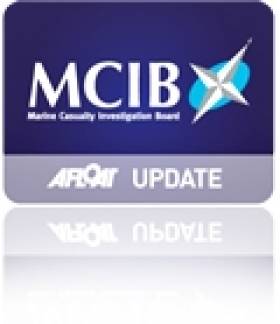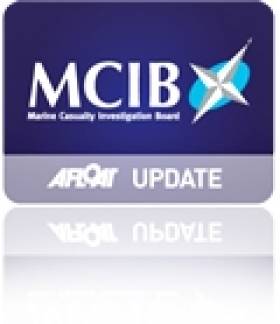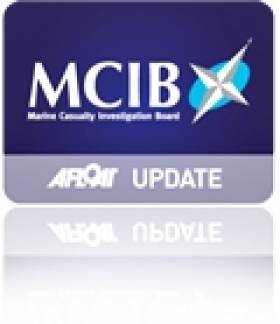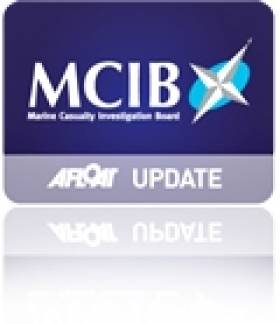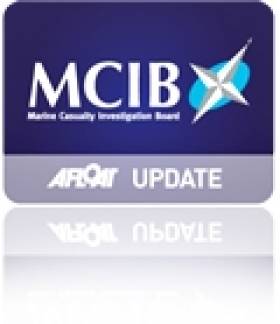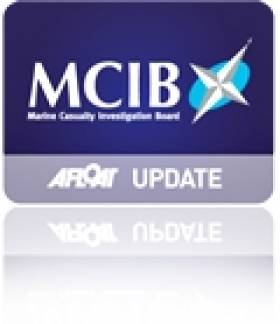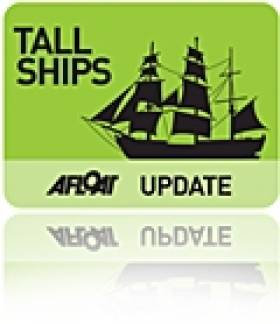Displaying items by tag: MCIB
Personal Beacons For Kayakers Recommended In Report On Inchavore Drowning Tragedy
#MCIB - The official report into the death of a kayaker on a Wicklow river last year recommends that anyone kayaking a river of Grade 3 or above should carry a personal locator beacon.
As previously reported on Afloat.ie, Shane Murprhy (21) from Baldoyle in North Dublin drowned while kayaking on the River Inchavore on 13 November 2014.
The inquest into his death this summer heard that Murphy became separated from his group while paddling the river swollen by heavy rains.
Despite righting himself a number of times, he was quickly thrown from his kayak and seen face down in the water before the river took him away from his fellow kayakers.
He was later found trapped in branches amid fast flowing water two sets of rapids down from where he was last seen.
The report into the incident by the Marine Casualty Investigation Board (MCIB) found that the river was rated between Grades 4 and 5 – advanced to expert – and within the capabilities of the group, some of whom had paddled it before without incident, and was only passable in flood conditions such as on that day.
However, it found that the noise of the river made communication between the group very difficult when out of line of sight, which hampered their search for Murphy when he became separated from the rest.
The MCIB recommends that "kayaking groups making descents on remove rivers of Grade 3 or higher carry registered personal locator beacons" or PLBs which would enable early alerting of rescue crews in the event of an emergency.
It also recommends that Canoeing Ireland advise kayakers in such situations to consider using waterproof radios to allow communication between group members.
Additionally it was found that the delay in contacting emergency services, due to lack of mobile phone signal in that remote part of Co Wicklow, "did not impact on the casualty’s survival" in this case.
The MCIB's complete report on the incident is available as a PDF to read or download HERE.
Lack Of Experience, Absence Of Radio & Stability Issues Compounded 'Zillah' Dinghy Tragedy - MCIB Report
#Zillah - Lack of seafaring experience and the absence of a VHF radio or other means of contact compounded a tragic situation that led to the death of a retired teacher after the capsize of his dinghy off West Cork last summer, according to the official investigation into the incident.
As previously reported on Afloat.ie, an inquest into the capsize of the Drascombe Lugger Zillah returned a verdict of accidental death in the case of 66-year-old Douglas Perrin, who drowned after his vessel overturned and sent him and two companions into the water off Castle Island near Schull on the evening of 13 August last.
The court heard that guests Marian Brown and Patrick Anwyl, neither experienced sailors, were taking turns at the helm under the supervision of Perrin, a sailing instructor for more some 30 years, when the boat overturned in gusty weather.
As the report by the Marine Casualty Investigation Board (MCIB) outlines, it was found that the boat - built before the Recreational Craft Directive requirement and of a type known to have stability issues in certain conditions – gybed suddenly on the approach to the Amelia Buoy at the Schull Harbour entrance, taking all three by surprise.
The vessel quickly turned turtle, with its centreplate retracting into the stowed position, and the guests managed to clamber onto the upturned hull with Perrin in the water beside them.
However, they did not have a VHF radio or EPIRB-type beacon on the vessel, and there were no other boats in the vicinity to witness the incident not spot the casualties and attempt rescue.
Despite the mild water temperature, none of the three were wearing more than light summer clothes with their PFDs, and Perrin spoke of feeling cold within 30 minutes.
After the three attempted to swim some 50 metres to nearby rocks on Castle Island, Perrin was separated from his guests, who later saw him drifting past the island making no effort to swim but with his head above the waves.
It was many hours later into the following day, after an alert by Perrin's wife who had been expecting the group's return, that Brown and Anwyl were located and rescued by emergency responders. The body of Perrin was found a short time later off Sherkin Island.
The MCIB found that the guests' lack of sailing experience "meant that they did not react correctly to the developing situation" when the boat suddenly gybed.
Moreover, the lack of a radio, which would have immediately alerted any number of vessels in the nearby Schull area as well as emergency teams, would have likely seen all three rescued in a matter of minutes.
It's also possible that had their PFDs been fitted with lights and whistles, the guests may have been spotted sooner by search and rescue crews.
The full report into the Zillah incident by the MCIB, including its safety recommendations, is available to download HERE.
Series Of Safety Breaches Led To Loss Of Three Lives In Tramore Bay Capsize - MCIB
#MCIB - Lack of adherence to water safety procedures led to the drowning of three fishermen off Waterford in the summer of 2013, according to marine investigators.
As previously reported on Afloat.ie, three bodies were recovered from the waters of Tramore Bay after a search for a missing fishing punt on the evening of 12 June 2013.
They were later named locally as brothers Paul, Shane and Kenny Bolger, all aged in their 40s.
Dunmore East RNLI coxswain Michael Griffin commented that the tragedy was "a devastating loss for the community."
He added: "I knew the men personally and had been at school with two of them. They were well known and respected by everyone."
The Marine Casualty Investigation Board's (MCIB) report into the fatal incident involving the MFV Dean Leanne, published this week, has found that a series of safety breaches contributed to the loss of the three men's lives.
Their small open vessel – which was rated to carry only two crew, and did not carry a valid Declaration of Comlpliance with the Fishery Vessel Safety Code of Practice – had headed out before 7am on the day to tend to lobster pots between Falskirt Rock and Brownstown Head.
This was in an area where the boat was not certified to operate, and where the sea conditions grew worse as the day progressed. The brothers had also not provided details of their trip with anyone ashore.
The fibreglassed exterior of the vessel was noted to be in poor condition with "extensive rot and decay" that would result in "reduced structural integrity" - putting boat and crew at risk as the swell built up.
Though it cannot be established exactly how the vessel came to capsize and throw the three overboard, it's believed whatever happened "occurred very quickly as no MAYDAY was transmitted by VHF radio or flares."
Two of the three men were found to be wearing personal flotation devices (PFDs) though only one of these was of the automatic hydrostatic release type, the other being manually operated and found still in its protective cover.
Both PFDs were also poorly maintained, with leaks in their air bladders.
The boat's EPIRB device, meanwhile, did not emit a signal to emergency services despite being found to have been manually operated, and subsequently coming into contact with water.
It was later found to have a defective microprocessor, and was one of a number of models for which its manufacturer later issued a recall notice, though family of the deceased confirm the handset was tested in the month before the incident.
The full MCIB report on the MFV Dean Leanne is available to download HERE.
Poor Navigation Standards On Container Ship Grounded On Arklow Bank Says MCIB Report
#MCIB - Lack of adherence to standard navigation procedures led to the grounding of a German-owned container ship on the Arklow Bank in January this year, according to the official report into the incident.
As previously reported on Afloat.ie, the MV Arslan II - which was sailing to Belfast from Turkey with a 4,000mt cargo of steel products - was dry-docked at Dublin Port after damaging her rudder on the sandbank some six miles off the Wicklow coast on 14 January.
A familiar visitor to the Irish Sea for more than two decades, mostly under her former name Coastal Isle, the ship was held in Dublin for more than two months while investigators from the Maritime Casualty Investigation Board (MCIB) examined all aspects of the vessel and the circumstances surrounding her grounding.
Their report is highly critical of the management of the 89m cargo ship, noting among other things that a stability calculation was not prepared on departure from her first port of call at Ceuta on the Strait of Gibraltar. Neither were her departure drafts or freeboard recorded in the ship's official log.
Stability proved to be an issue on the voyage, with a copy of the plan in force at the time of the incident showing the master's concerns at the vessel's heavy rolling even in even Force 4 winds.
Weather forecasts of Force 6 to 7 winds prompted the ship's master to alter course on approach to the Arklow Bank in the Irish Sea, seeking shelter from the coast.
But via a combination of outdated charts and incorrect tide tables, over-reliance on GPS over visual navigation cues, and miscommunication between deck officers, the Arslan II passed the southern marker buoy on the wrong side and grounded on the south end of the sandbank.
The MCIB took the ship's master to task for failing to report the grounding incident to the Irish Coast Guard, instead chartering her own tug to tow the vessel to the nearest available port large enough to accommodate her, which was Dublin.
In addition, investigators discovered that this was the second grounding incident for the vessel, following an incident in Scottish waters on the Isle of Bute in July 2012.
The full MCIB report is available to download below.
Lack of Lifejacket Key In Lobsterman's Death Says MCIB Report
#MCIB - Wearing a personal flotation device could have helped save the life of a fisherman whose body was found at the Saltee Islands off Co Wexford this summer months after his disappearance, according to marine accident investigators.
As RTÉ News reports, the body of Paddy Barry, 56, was discovered on the shore of Great Saltee Island on 4 May more than five months after his fishing vessel, the MFV Leonora Jacinta, was found south of the island with no one aboard on 25 November 2013.
The official report into the incident by the Marine Casualty Investigation Board (MCIB) established that Barry, a part-time fishermen who could not swim, had set out from Kilmore Quay alone on the morning of his disappearance to lift and bait lobster pots, and retrieve a string of fouled pots close to Shoal Rock.
It was at the latter location where his boat was last seen headed at 11am, but around 11.50am a passing fishing vessel noted that Barry's boat had been stationary in that spot for some time.
Another vessel approached some 30 minutes later and found that the Leonora Jacinta was secured to a line of pots with its engine idling and its pot hauler set in neutral.
Lifeboat and coastguard teams were contacted immediately and began what became a 26-day search by land, sea and air around the area where the Leonora Jacinta was found, but the operation was stood down on 22 December due to deteriorating weather conditions.
According to the MCIB report, witnesses familiar with Barry confirmed that two personal floatation devices (PFDs) found on the Leonora Jacinta were the vessel's only PFDs – and indicated that Barry preferred not to wear one when he was working, against the Code of Practice for Fishing Vessels.
It was also found that the boat's gunwale was only half a metre high at the pot hauler, giving little stability in that deck position. Though not against regulations, it suggests that Barry could have been pitched overboard by the vessel lurching in even a slight swell.
In such an event, strong currents in the area could have carried Barry some two miles northeast of the boat within two hours, and lacking a lifejacket it would have been extremely difficult both for him to stay afloat and for rescuers to spot him.
Had he been wearing a PDF "it is likely that he would have remained on the surface and been visible to the search teams, which could have led to an early recovery," says the report – which also recommends amending the Code of Practice to set a minimum height for bulwarks, guard rails and hand rails.
The full MCIB report on the MFV Leonora Jacinta incident is available to download below.
MCIB Issues Report On Fisherman's Death By Head Injury On 'FV Liberty'
#MCIB - Poor adherence to various safety regulations made worse the situation in which a fisherman died of severe head injury off Cork in February last year, according to an official report into the incident.
As previously reported on Afloat.ie, the man was one of three crew on the fishing trawler FV Liberty that was hauling cod off the Old Head of Kinsale when the tragedy occurred on the evening of Thursday 14 February 2013.
The Marine Casualty Investigation Board's (MCIB) report into the incident details the sequence of events that led to the fatality, which was caused by the failure of split links in the vessel's hauling gear as a cod trawl net was being hoisted, striking the casualty on the head.
It was determined by the MCIB that the ropes and links used on the vessel were prone to jamming and the boat's head blocks were in poor condition - and that the incident may have been avoided if these were properly examined and maintained.
It was also found that none of the three crew had undergone basic safety training, and that none was wearing protective headgear on deck.
While the skipper was an experienced fisherman, he was new to this particular vessel. The casualty, too, had only joined the vessel that day, while the third crew member tasked with operating the lifting gear "would not be considered sufficiently experienced to conduct such a task".
Moreover, the vessel's radio equipment was found to be in poor condition, making communication with emergency services challenging.
Above all, the MCIB states that the vessel "did not comply with the requirements of the Fishing Vessel Code of Practice.
"The deficiencies in place on-board FV Liberty during the MCIB investigation showed that risk assessment was not completed, annual inspection was not carried out for lifting equipment, and personnel had not completed the required training."
The full MCIB report into the FV Liberty incident is available to download below.
Excessive Speed, Poor Visibility To Blame For Lough Ree RIB Collision - MCIB Report
#MCIB - Excessive speed and poor visibility were the biggest contributing factors in a RIB crash incident on Lough Ree two years ago, according to accident investigators.
One passenger sustained head injuries when the RIB, with a helmsman and three passengers on board, collided with the centre support polars of the Athlone Railway Bridge, close to the Westmeath town's marina, on the evening of 14 July 2012.
Though the injured passenger required a transfer to Beaumont Hospital in Dublin after losing consciousness, all four people on the RIB were later released from hospital.
The RIB itself, however, was damaged beyond repair, says the Marine Casualty Investigation Board (MCIB) report into the incident, which also detailed that the nature of the damage caused was consistent with a RIB accelerating at a speed greater than 15 knots.
This was in spite of speed limits of the Shannon Navigation set at no more than 5kmph within 200m of any bridge, quay, jetty or wharf, when in a harbour area or within 100 of any moored vessel.
It was also determined that was the collision occurred around sunset, "it is likely that the light conditions would not have been good".
The full MCIB report into the Lough Ree incident is available to download below.
MCIB Issues Report On Castletownbere Drowning
#MCIB - A poorly positioned lobster pot hauler and failure to maintain a working PFD have been identified among the main contributing factors in the death of a retired schoolteacher and recreational fisherman off West Cork two years ago.
That's according to the Marine Casualty Investigation Board's (MCIB) report on the incident off the Beara Peninsula on 17 August 2012, in which 66-year-old Pearse Lyne drowned after his fishing boat capsized.
As previously reported on Afloat.ie, Lyne's death was the second tragedy to befall the Castletownbere area in mid August 2012, occurring just days after farmer and poet John O'Leary drowned off Cod's Head.
The MCIB report established that Lyne had set out to sea on the morning of 17 August 2012 in a hurry to retrieve his lobster pots as that year's fishing season closed out.
Though Met Éireann's reports on the day's weather conditions were favourable, anecdotal evidence from local mariners at the time suggest a heavy swell in the area.
Investigators also found that Lyne's unregistered boat, while in sound working order, had its lobster pot hauler fitted on the starboard stern quarter, not in the usual forward position, which may have made affected the boat's stability – although it is unclear exactly what caused the capsize.
In addition, Lyne was found not to be wearing a lifejacket or PFD when his body was removed from the water, though there is evidence he was attempting to access one from the forward locker when he was overcome by the situation.
But even if he had, the PFD found on board his vessel was determined to be defective, with its gas cartridge already expended.
The report recommends that a Marine Notice be issued recommending all mariners inspect their PFDs for defects such as expired or expended gas inflation cylinders.
The complete MCIB report can be downloaded as a PDF below.
Engine Failure Preceded Astrid Incident Says Interim Report
#Astrid - Engine failure led to the grounding of the tall ship Astrid off the Cork coast a year ago, according to an interim report by marine investigators.
The 42m Dutch brig's 30-strong crew, most of them sail trainees, were rescued in a major operation after it ran onto rocks between Oysterhaven and Kinsale in choppy seas during last summer's ISA-organised Gathering Cruise.
Built in 1918 and in service as a cargo vessel till 1975, the tall ship foundered in the same spot where the barque Falls of Garry sank in 1911.
The Irish Times reports on the Marine Casualty Investigation Board's (MCIB) findings ahead of its final report to come after "the natural justice procedure".
Dutch authorities are involved in the Irish-led investigation that began in the days after the Astrid accident. There is as yet no indication as to what caused the vessel's engine to fail.
MCIB Report On 'Flying Horse' Highlights Safety Issues
#MCIB - 'Safety first' is the message from marine investigators in their report into an incident on board a sightseeing vessel off the Skellig Islands two years ago.
The Flying Horse, a 33-foot passenger boat crewed by a single skipper, was carrying 14 passengers towards Skellig Michael on the morning of 29 June 2012 when it began taking on water after coming off a large wave.
The skipper then turned the boat around and attempted to contact the owner by mobile phone, without making any use of the vessel's VHF radio.
The passengers also have difficulty accessing the boat's lifejackets from their storage compartments, and there were not enough for all on board.
All were landed safety ashore at Ballinskelligs, Co Kerry, though they were "somewhat traumatised" by the experience.
The official report into the incident my the Marine Casualty Investigation Board (MCIB) identified a number of safety issues with the Flying Horse, not least a lack of proper instruction for donning lifejackets.
MCIB investigators identified the boat's speed before the incident to be around 18 knots, too fast for the rough seas at the time, which contributed to the hull damage that saw the boat take on water.
Moreover, no official records could be found to show that the skipper held the necessary qualifications to be the master of boat in question. or that he was in possession of a Radio Operator’s Certificate - a requirement for all passenger vessels.
The boat was also found to be technically overloaded, carrying two more passengers than allowed by its licence - not to mention "insufficient" crew for her safe operation.
The full report is available to download below.




























